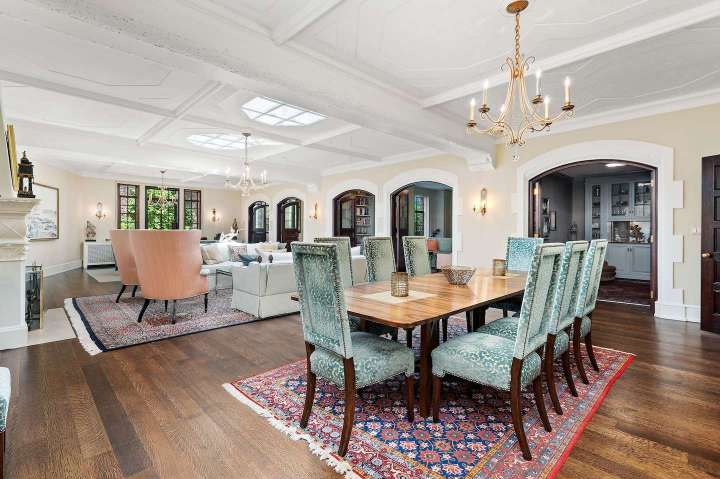Tilden Gardens co-op apartment offered at $2.6 million

Rupp said Megan’s motivation was purely personal.
“These people have been complaining for too long about giving up a house, having to walk down a hall to the apartment and having no outside space. Living room [is] too small,” Rupp said of his daughter’s thinking. “I have to get them off my back. I’ll find them a place that they’d like.”
The apartment wasn’t the problem as much as the route to it was.
“The part of it I didn’t like at all is one had to enter the apartment by going through the main lobby, which was very beautiful, but then up the elevator and down a long hall,” he said. “I had the sense that I was a rat in a box.”
The solution was a one-of-a-kind apartment at Tilden Gardens, a six-building complex on a five-acre triangular parcel off Connecticut Avenue NW. James M. Goode, in his 1988 book, “Best Addresses,” about Washington’s distinguished apartment buildings, described Tilden Gardens as “the city’s most innovative large apartment house constructed in the 1920s.” Until the Watergate arrived in the 1960s, Tilden Gardens was the largest luxury co-op apartment complex in Washington.
This apartment was originally a restaurant in the main building. The Tilden Gardens Cafe opened its doors in 1929. Judith and Milton Viorst reviewed it in their 1970 guide to Washington’s better restaurants: “If your definition of gourmet foods includes a beautiful pot roast or a homemade custard pie … then you’ll be thoroughly impressed with the splendid selection of high-quality dishes available at this restaurant.”
Despite that review, the restaurant closed its doors not long after, and the space was rented to the Daughters of the American Revolution until 2005. Two years later, real estate agent Ed Carp bought it and converted it into an apartment. Carp sold it to Rupp and his wife in 2013. The apartment met many of their requirements.
“It has an exterior entrance, so we didn’t feel like it was an apartment,” Rupp said. “I kind of had a sense that it was a house attached to an apartment with the benefits of a front desk out the back door, somebody to accept deliveries, somebody to watch over things.”
Rupp and O’Bryon undertook an extensive renovation. They installed hardwood floors, a gas fireplace and octagonal skylights in the main room. They added a library, a fourth bedroom and laundry facilities. They redid the kitchen and enlarged the bedroom windows.
But they left many of the period features, such as the beams and arches in the main room. “What we didn’t change is what attracted us to it in the first place,” Rupp said.
They also added a private patio. Carp had negotiated the right to build the patio but never got around to it. “The prior owner, the fellow who did the conversion, he was quite smart,” Rupp said.
Not only did they have their own private outdoor space, but they also had Tilden Gardens’ extensive lawn.
“The other thing we liked about the apartment very much is if you walk outside, you have the Tilden Gardens gardens, which is a great place to sit, read a book, meet friends,” Rupp said. “We lost our yard [at the Fessenden Street house], but we acquired the patio and acres of green space.”
Rupp said that in many ways, the 3,600-square-foot home offered the benefits of living in an apartment and a house. He and his wife could travel and not worry, knowing that someone was keeping an eye on their home, and they could entertain large gatherings.
“We have had 125 people,” Rupp said. “It didn’t feel crowded.”
Rupp, who lives most of the year in Europe, has been less inclined to return to Washington since his wife died in October, which is why he has decided to sell.
“I’m there one or two days a year,” he said. “It makes no sense for me to hold onto it.”
The four-bedroom, three-bathroom co-op apartment is listed at just under $2.6 million. The monthly fees are $2,455.
$2.6 million
- Bedrooms/bathrooms: 4/3
- Approximate square-footage: 3,600
- Co-op fee: $2,455 monthly
- Features: This co-op apartment at Tilden Gardens was once a restaurant known as the Tilden Gardens Cafe. It was converted into an apartment in 2007. Although the apartment is attached to the main building, no one lives above or below the unit. The apartment can be reached through the main entrance or a private entrance. Parking is available for rent.
- Listing agent: Nancy Itteilag and Chris Itteilag, Washington Fine Properties






